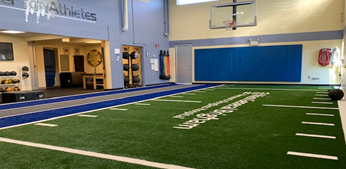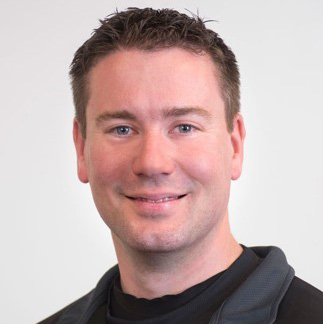06/01/2022
What to Look for in an Off-Season Training Program
By Mike Feld, ATC, CSCS, PES
Oyster River High School Athletic Trainer
Over the next few weeks schools will be ending and all of our school sports seasons will be wrapping up. This is a time of year when both coaches and athletes are looking for options for off-season programs. Many athletes will participate in some sort of summer league, others will look for a few weeks of various skills camps, while others will head off to participate in college scouting showcases. No matter what your off-season plans are, a good quality conditioning program can play a vital role in the success of your upcoming season. If you were to do a Google search for “sports performance programs in your area” you would likely end up with a larger number of choices than you were expecting. More and more lately it seems like “sports performance” professionals are popping up all over the place. This can make selecting the facility, program, and trainer you work with quite a daunting task. Most sports performance facilities will boast the same things; making you bigger, faster, stronger, improve agility and footwork, and increasing cardiovascular endurance. Some will even promote a significantly reduced chance of injury by participating in their programs. With just a bit of knowledge and a little research you should be able to narrow down your list of choices to a few viable options.
The Facility
An easy first step when determining a conditioning program is to evaluate the facility. Training facilities come in all shapes and sizes these days. What works and what appeals to you? Is it the brand-new shiny building that is part of some large national chain of gyms? Do you prefer the small, dingy gym that looks like someone’s garage and is right out of a Rocky movie? Maybe it’s the local gym with lots of cool looking stuff and walls lined with jerseys of players that have gone through their facility. I would strongly encourage you to visit a facility before deciding to train there. Think about your sport, does the set-up of the facility allow them to meet the training demands of your sport? Pay attention to the setup of their weight training area; is it set up with a lot of machines or is it mostly free-weights, med balls, and resistance bands. Many facilities prefer the use of machines like Cybex and Nautilus because they are safer and easier to teach how to use them. The downside of using machines is you can often only use them for one exercise in one plane of motion, which is generally not how sports movements work. If you play a field sport, you may want to find a facility that has more space, maybe even an outdoor field space or an indoor turf area to use for more sport specific training.
 It is also important to know who is developing the sports performance programs within the facility. Is the program being planned out by one person and then handed out to everyone to follow or is there someone developing a program specific for YOU. Obviously, different sports have different training needs and goals but even within the same sport the athletes themselves may have very different needs. Not all athletes will be able to train at the same volume or level of intensity and it is important to work with someone who understands your specific needs and is able to modify the program to meet those demands.
It is also important to know who is developing the sports performance programs within the facility. Is the program being planned out by one person and then handed out to everyone to follow or is there someone developing a program specific for YOU. Obviously, different sports have different training needs and goals but even within the same sport the athletes themselves may have very different needs. Not all athletes will be able to train at the same volume or level of intensity and it is important to work with someone who understands your specific needs and is able to modify the program to meet those demands.
The Trainer
The fitness professional who you are working with plays the most vital role in the success of your off-season training program. Much like you are encouraged to visit a facility before deciding to train there, it is also highly recommended that you meet with the trainer before deciding to work with them. Treat this as an interview, get to know a little bit about their background both professionally and personally. The first thing I would look at when choosing a trainer to work with is the type of certifications that they’ve obtained. If they do not have a certification then cross them off your list! Being exceptional at a certain sport, even playing at the Division I or professional level does not necessarily mean that you are qualified to train others.
There are a variety of options for fitness professional certifications. The two organizations that are generally regarded as the gold standard for fitness professionals are the National Strength and Conditioning Association (NSCA) and the National Academy of Sports Medicine (NASM). In addition to these two organizations there is also the American Council on Exercise (ACE) and the International Sports Science Association (ISSA) which also offer personal trainer certifications. To make things even more complicated, each organization has different requirements for certification and can also offer different levels of certification. The ISSA, ACE, and NASM focus mainly on a “basic” personal trainer certification. The minimum requirements for certification are that you must be over 18 years of age, have a high school diploma, and be certified in CPR. This does not mean that just anyone can receive a certification and call themselves a personal trainer. Applicants must still pass a rigorous certification exam and complete continuing education requirements every few years to remain certified.
Certification through the NSCA can be a little different. The NSCA has a few different levels of certification depending on the population you would like to train. They do offer the same Certified Personal Trainer (CPT) certification as the other organizations with the same minimum requirements. They also offer what many regard as the highest level of certification for a fitness professional, the Certified Strength and Conditioning Specialist (CSCS). Unlike other organizations, the NSCA CSCS certification requires a four-year college degree in addition to other minimum requirements. This certification incorporates aspects of exercise science, sports psychology, and nutrition as well as the other exercise principles found in typical certification programs.
The Training Cycle
When looking at options for off season training programs, you, as well as your trainer, should agree on where you are in the training cycle. Training the correct way at the correct time of year becomes an important aspect in trying to peak at the right time for your specific season.
Rest/Recovery Phase:
Immediately after your season ends, you generally want to take some time “off” from your sport. This does not necessarily mean that you are sitting around doing nothing for a few weeks; however, your training intensity and volume should be relatively low and the focus should be on recovery from your season. This is when you want to take care of any nagging injuries and look to work with someone who can correct any imbalances in strength and mobility that would lead to inefficient movement and training patterns.
Hypertrophy/Endurance phase:
During this first real phase of off-season training your focus should be on promoting muscle growth and general sports movement without worrying about getting too specific to your own sport.
Strength Phase:
This is where the training volume and intensity starts to ramp up. The focus is getting stronger by becoming more efficient in muscle recruitment and beginning to apply this to more sport specific movements.
Power Phase:
Here you focus on taking the strength gained in your previous phases and generating it quickly to create maximum power during sport-specific movements.
Pre-season Phase:
Immediately before you season begins, the goals shift, and sport-specific movement become more of a focus. This is where you harness all the strength and power you have been working on for months and apply it to your speed and agility drills. You can expect sports performance programs to start to get creative, utilizing a wide variety of mini hurdle, agility and footwork drills to simulate movements particular to your sport.
Other Considerations:
There can be several other factors to consider when choosing an off-season training program. Location, distance you are willing to travel, schedule access and availability, training ratios (group vs. 1-1), to name a few.
The biggest thing you can do to help yourself choose the right program is to educate yourself about what you need and determine your individual goals. Talk to athletes who have trained at various facilities and worked with their staff to hear what they have to say about their experiences. Was the facility sufficient to meet their needs? Did they get along with the training staff? Did the staff seem to have a good working knowledge of their sport and its demands? Most importantly, did they see improvements?
Do not get caught up in “name dropping” or facilities boasting about how many athletes they have had get drafted or how this person plays with the Patriots now and how these athletes went to the NHL. What has worked for others may or may not work for you. It is up to you to know what your fitness goals are and find the person and program you feel can best help you meet them.

About Mike Feld:
 Mike Feld is a Certified Athletic Trainer through the National Athletic Trainers Association. He is also certified through the National Strength and Conditioning Association as a Strength and Conditioning Specialist as well as a Performance Enhancement Specialist. Mike graduated from Endicott College with a BS degree with a focus on Athletic Training. He has served as the Head Athletic Trainer for Oyster River High School for just over 19 years as well as coordinating the off-season conditioning programs for many of their sports programs.
Mike Feld is a Certified Athletic Trainer through the National Athletic Trainers Association. He is also certified through the National Strength and Conditioning Association as a Strength and Conditioning Specialist as well as a Performance Enhancement Specialist. Mike graduated from Endicott College with a BS degree with a focus on Athletic Training. He has served as the Head Athletic Trainer for Oyster River High School for just over 19 years as well as coordinating the off-season conditioning programs for many of their sports programs.
Throughout his career as an Athletic Trainer and a Strength Coach Mike has worked with athletes ranging from middle school to high school, to professional level athletes. Mike also spends time working in the Center for Athletes working with athletes as well as post-rehab clients helping them reach their performance goals.
Tagged In: